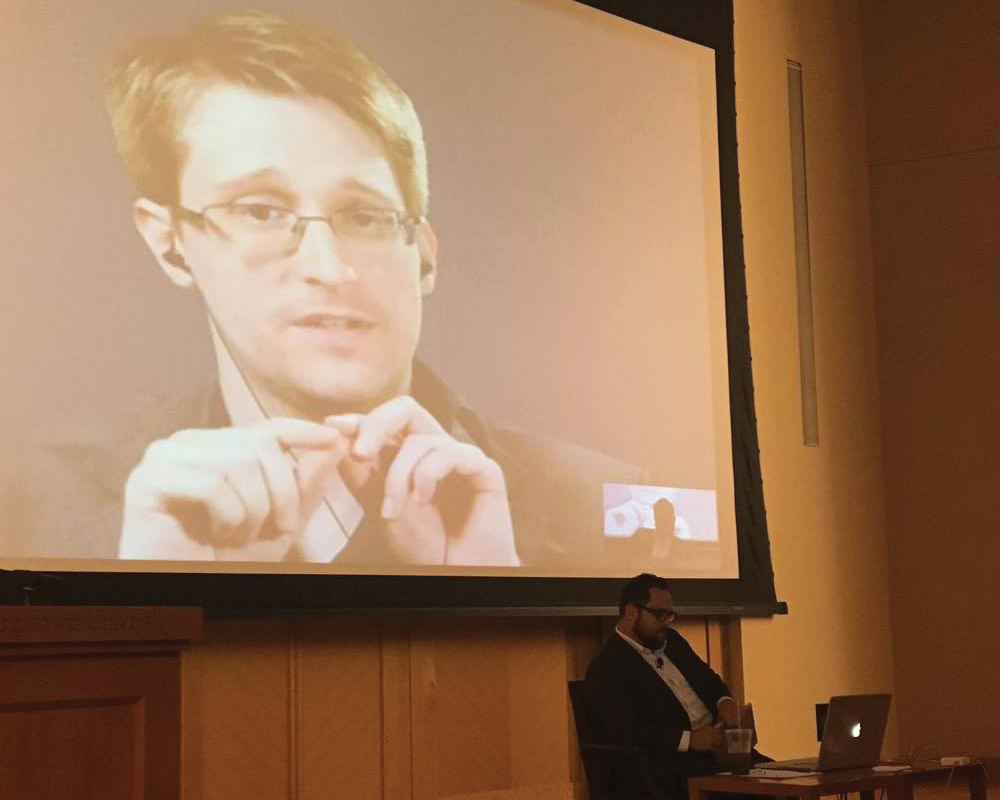
The GU Lecture Fund hosted former National Security Agency employee Edward Snowden, who called in via Skype from Russia, for the second time Wednesday.
The right to privacy is essential in any free society, argued former National Security Agency employee Edward Snowden in his second virtual discussion with Georgetown students Wednesday.
Snowden, who participated in the discussion in Lohrfink Auditorium via Skype, is currently living in asylum in Moscow, Russia, after he leaked classified information from the NSA in 2013, disclosing the organization’s surveillance programs. He is wanted by the U.S. government for the theft of government property.
The event, hosted by the Lecture Fund, coincides with the recent release of Oliver Stone’s new film “Snowden,” portraying Snowden’s release of the documents and its aftermath, on Sept. 16.
On Oct. 5, the FBI revealed that since the summer it had been investigating a former NSA contractor for stealing classified documents, putting national security under the spotlight again. The New York Times reported Oct. 5 that Yahoo was searching emails for signs indicating state-sponsored terrorism as part of its mechanisms searching for child pornography and spam.
Snowden said those who argue they do not mind the NSA’s scanning their email — citing the fact that they have nothing to hide — underestimate the impact of government tapping into all internet usage.
“That is really a misunderstanding of the way people interact with technology,” Snowden said. “Because the difference is this is voluntarily; there is a difference between intensely intimate details that you wouldn’t tell anyone listened to without our consent.”
According to Snowden, both consent and privacy are essential in a free society.
“When you are talking about a liberal society, a modern society, our society, our government was founded on one bedrock principle and that is the consent of government — consent is only meaningful if it’s in a form,” Snowden said.
Snowden said privacy is about protecting information, not hiding it.
“Privacy isn’t about something to hide, privacy is about something to protect and that thing is you,” Snowden said. “When you lose privacy, you’re losing an open society, you’re losing the opportunity to make mistakes.”
Privacy is the most fundamental human right, according to Snowden.
“Privacy is the fountainhead from which every other right is derived,” Snowden said. “Privacy is the right to the self. Without it, you are not even part of society: You are just subject to it.”
Snowden said he was surprised by the events following his decision to leak classified information.
“I expected a five-day story,” Snowden said. “I thought I would end up in jail.”
Snowden currently resides in Russia, after the country granted him asylum in June 2013, the same month he began releasing the documents.
Snowden said he went to the press to raise awareness and make it more difficult for the U.S. government to deny the existence of his documents.
“I wanted to get the issues back on media and change the conversation,” Snowden said. “But the media doesn’t tell stories without faces.”
According to Snowden, Stone’s film accurately portrays the state of U.S. policies relating to information and privacy.
“My particular focus of the film that I was pleased to see is that a lot of the policy aspects were accurate,” Snowden said. “If my side of the story is screwed up I’m not that worried because I don’t care so much about my reputation.”
Lecture Fund Chairman D.J. Angelini (MSB ’17) said bringing Snowden to campus two years in a row showcases how classroom lessons translate to the world outside the university.
“Today we thought with all the news regarding privacy and civil liberties and the release of his movie, there isn’t a better time to bring a more relevant speaker to highlight some of these lessons we learn in the classroom in a real-life, tangible way,” Angelini said.
The Lecture Fund’s event featuring Snowden last year was delayed by 45 minutes due to a technical glitch.
Danae Alogoskoufi (COL ’20), who attended the event, said Snowden’s arguments on privacy were reasonable.
“I particularly agreed with Snowden when he argued that without privacy all our other rights are diminished,” Alogoskoufi said. “I thought he was very articulate with his views and I liked the fact that he did not want the focus to be on him but at the same time he realized that if he did not speak out they would bury his discovery.”
Aishah Malhas (COL ’20) said she appreciated Snowden’s attitude in light of the public attention he has garnered.
“His modesty regarding his role in disclosing top-secret NSA files and his indifference about the consequences that this bore on his own life proved how passionate he was about what he was fighting for and how much he considered cyber freedom to be essential,” Malhas said.




















